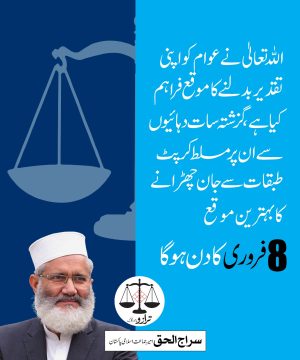Islamist parties in Pakistan are gearing up for the upcoming elections that are scheduled to take place on February 8. With more than 20 registered Islamist parties, including Tehreek-e-Labaik Pakistan (TLP), Jamat-e-Islami (JI), and Jamiat Ulema-e-Islam – Fazl (JUI-F), actively participating in the campaign trail, the political landscape is witnessing intense activity.
These parties are doing their utmost to connect with people and gain their support in the run-up to voting day. To persuade people of their objectives, they are using rhetoric that is both politically advantageous and ultra-conservative. While the TLP’s leadership network is using the blasphemy debate to drum up supporters, JI is assuring its supporters that if it wins the next general elections, it will secure the independence of Palestine and Kashmir. Meanwhile, the Maulana Fazlur Rehman-led JUI-F is trying to appeal to voters by playing the age-old tactic of constructing imaginary threats to Pakistan from opponents of Islam. The political group is also attempting to fill the political vacuum left by former Prime Minister Imran Khan’s Pakistan Tehreek-e-Insaf (PTI) party in Baluchistan and Khyber Pakhtunkhwa.
Some Islamist parties are running low-key election campaigns as they are apprehensive that their alleged links to incidents of violence may attract criticism from the international community, prompt a governmental crackdown, or, worse, start a new inquiry by the Election Commission of Pakistan (ECP).
The polling record of Islamist political parties indicates that they have never been able to secure significant electoral victories. They have only done well in elections when they have entered into arrangements with mainstream political parties or formed alliances with other religious political parties.
The Muttahida Majlis-i-Amal (MMA), which became the third-largest political force in the 2002 general elections, was the last significant coalition of religious groupings that made a substantial political impact. That, however, was possible only because mainstream political parties, pushed by the conflict with Pakistan’s former military ruler Gen Pervez Musharraf, either boycotted the elections or chose not to run candidates.
But since then, Islamist organizations have not been able to revive the coalition, and it does not appear that they are making any effort to build an alliance of that kind ahead of the upcoming elections.
In fact, it seems that the religious political parties will be competing with one other in the upcoming elections, which is expected to further split their votes. For instance, Pakistan Sunni Tehrik (PST), a Barelvi sect party registered with the ECP and contesting the election, will face off against the TLP, which is vying for votes from the same sect. Similarly, JI and JUI-F, who were formerly allies under the MMA, will face off in Khyber Pakhtunkhwa and other places. Furthermore, it appears that these Islamist parties will depend on the influence they have in various regions of the country to make an impact on election day.
However, it seems that Islamist groups are feeling the need to foster inclusivity and appeal beyond their religious base to improve their chances. The TLP’s election manifesto for 2024 has a lot to offer as compared to the elections of 2018. The party’s 25-point manifesto promises more on political matters while guaranteeing that religious minorities’ rights would be upheld per the Constitution. The party, which ran for office in 2018 on a platform of preserving the honor of the Prophet Muhammad, has now unveiled a new party flag devoid of the Prophet Muhammad shrine image.
In its 52-page manifesto, JI lays out an ambitious agenda that includes a legislative discussion on defense spending and a review of contracts with Independent Power Producers (IPPs). The party also pledges to create a charter for the economy and employ Vision 2050 for a prosperous future.
Amid a highly volatile political climate in Pakistan, the task ahead for religio-Islamist parties in the 2024 general elections is certainly not an easy one. The country has been marked by years of battles among institutions and political elites, leaving voters reeling with record-high inflation and growing anger towards those in positions of responsibility.
While the Islamist parties may have experienced electoral success in the past, such as in 2002, it is unlikely that they will be able to replicate or even come close to that level of achievement in the upcoming elections. The sentiment among voters does not favor any Islamist group to an extent that would result in a clean sweep of the elections.
However, this does not mean that the support base of Islamist parties will shrink in the next elections. In the 2018 general election, the Islamist parties together received the support of over 5 million votes. They seem prepared to increase their total vote share, as millions more people have become eligible to vote in the last five years.
However, it is still to be seen if they can cause an upset or put pressure on major political parties.

































